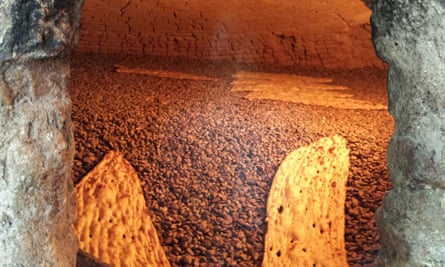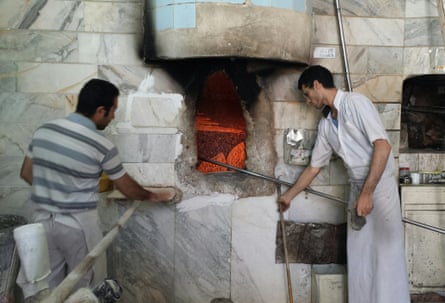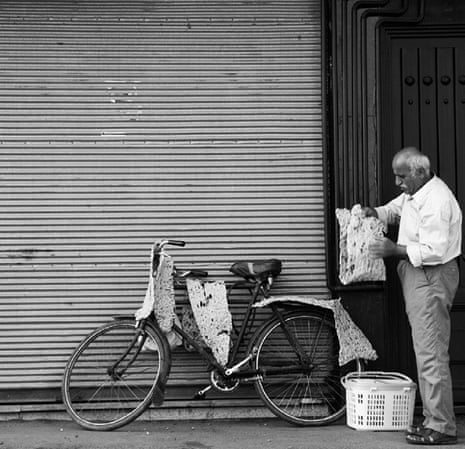“Not only have they increased the price, they’ve reduced the weight, though don’t tell anyone I told you,” laughs a young baker, no more than 25, who speaks quickly and works even faster in a bakery just off Khayyam street, near south Tehran’s Mowlawi avenue.
While the main street is abuzz with salesmen and labourers yelling and screaming and moving carts, this tiny alley seems serene. Men and women calmly pass by, and as the call to prayer is read residents step out of their shops and homes and walk to the mosque.
As I approach the bakery, the sweet, warm smell of fresh bread and toasted sesame seeds begins to fill the air – this bakery makes sangak, an oval-shaped sourdough flatbread baked on a bed of stones.
Bakeries, not usually a place of much excitement, have been the scene of heated conversations these past days after prices went up on 1 December by 30%.

A young girl walks in and asks the new price, which is 800 tomans for each sangak (around 18p or $0.28), up from 600 tomans. She shakes her head in disappointment as she asks for three.
Another man steps into the shop, and the bakers ask after his young child. “She’s doing ok, better, but I’m not,” he replies. “How are you supposed to feed a family ten loaves of bread a day on a labourer’s salary?” He has six children, he tells me.
The night before, in my own neighbourhood bakery, I stood in line for half an hour and watched people abruptly, if politely, tear at each other’s opinions over prices. One woman grumbled: “What they [the government] can’t afford, they take out of our pockets.” A few others followed suit.
But out of the blue, a man in the middle of the queue with a professorial voice said: “Bread prices have not gone up for three years. The government had no choice.” He further explained that the government was subsidising bread, and so it wasn’t a matter of taking money out of anyone’s pocket. An awkward silence ensued.
Sensing the death stares, he casually said to no one in particular: “Aslan beh man che?” (What is it to me?) Anytime you say something that’s not entirely against the government, people denounce you as a spy.”
Perhaps he was echoing economist Saeed Laylaz, who wrote in Etemad newspaper: “Those who say this price increase should not have been imposed should also say where the extra subsidies could have come from.”
The daily Donyay-e Eqtesad has reported that the “real” price of a loaf of sangak (without subsidies) would be 1460 tomans (32p, or $0.51) and that people “do not realise the value of the bread they are consuming.”

Days before the increase, the Bakers’ union instructed bakers to reduce the weight of each loaf by 10%.
“The price of flour we buy from the factory has also gone up, so there’s no bigger profit for us, unlike what everyone is saying,” he quips. “Our salaries haven’t gone up either. How are we supposed to buy bread at the extra cost on a labourer’s salary?”
The government’s inability to afford subsidies has also affected flour quality.
“This flour is just horrible, I hate to even use it,” my grandmother said after climbing up the kitchen ladder to produce a big bag of flour, which she threw on the table. “See, see those tiny yellow particles? There not supposed to be there, I don’t know what they are doing to this flour, but they are adding things which aren’t supposed to be in it.”
As we cooked - shami kabob in the style of our hometown in Khuzestan, minced lamb patties in batter - my grandmother pointed to infinitesimal dots forming on the batter in the pan. When we finished frying the patties, I could barely recognize the colour, which was more like light yellow than the traditional dark golden brown.
Whole-wheat flour, the traditional ingredient for shami kabob, has been difficult to find in Iran for years. Sangak should also be made with whole-wheat flour, although it is now baked with the same white flour as breads like taftoon and barbari.
Back in the bakery near Khayyam street, a poorer area in the southern parts of the capital, a colleague of the young baker tells me not to bother looking. “You won’t find whole-wheat flour anywhere. They take out the bran and germ to feed livestock,” he claims. “The flour we get is like white chalk, I’ve no idea what they’ve been putting into it. Strange particles form when we make the dough, and it takes extra time to work the dough and try to produce a decent loaf. Then people blame us for the quality.”
He tells me that the best flour used to come from Gonabad, in eastern Iran, or Kermanshah, in the west. But they now purchase their flour from factories within the province. This bakery buys theirs from Mihan and Vaziri, two of the biggest flour factories in Tehran.
While during the time Mohammad Khatami was president, the government declared Iran had reached self-sufficiency in wheat, it only took a few years for that to reverse. This year alone, over 3m metric tonnes of wheat was imported for the Iranian dinner table or sofreh (the dining mat spread on the ground) from 16 countries including Lithuania, China, Azerbaijan and Germany.
The 117kg of bread each Iranian consumes regularly has to come from somewhere.
Elsewhere in south Tehran, I ask a baker who also sells cakes and muffins with his barbari bread (a crisp, glazed loaf) if the price of pastries will also be increasing.
“It should, but consumers simply can’t afford it,” he tells me. “I am paying more for flour, but if I increase the price of those cakes from 8000 to 10,000 tomans ($3.50, £2.25) a kilo, no one will buy it. With bread, it’s different: people will buy bread no matter what the price.”
By the alley to the left of the bakery, an old man is preparing to inject heroin. With shaky hands he flicks on a lighter and starts warming the drugs on a spoon. People pass by casually. I ask the baker if he knows the man, and he shakes his head: “Only enough to give him a loaf of bread when he asks for it. But he barely eats.”
I walk out of the shop with three loaves of barbari bread and remember the esteem with which we were taught to treat bread growing up. If it fell on the ground, you picked it up, kissed it and put it politely in the special bin for stale bread. You didn’t tear off the crusts, you didn’t throw any away. When we were in the village, we baked our bread daily, and my grandmother said a prayer of thanks for each loaf that came out of the stone oven in the yard.
Times have changed. In Tehran alone, 150,000 metric tonnes of bread are thrown away annually.

Comments (…)
Sign in or create your Guardian account to join the discussion